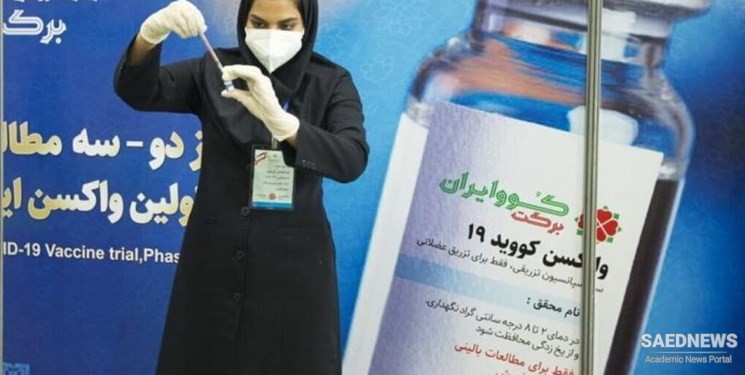"We have done four different studies on the Barakat vaccine, and different age groups were involved in the studies, and now we have been able to get a license for the 12 to 18-year-old people," Director of the Barakat vaccine clinical trial Hamed Hosseini said. Hosseini said that in the first phase, 60 volunteers will enter the study, 10 of whom will receive the Barekat Vaccine, but the rest will be divided into two groups, some receiving Barekat and others receiving the Chinese Sinopharm Vaccine for comparison.
"After completing the first phase and determining the safety profile of the vaccine for this age group, we will start the second phase involving 440 individuals and they will be compared with those receiving another vaccine," the director of the Barakat vaccine clinical trial added.
COVIRAN Barekat was unveiled in December 2020, and received public use license in June.
Iran, which has been hit by five waves of the deadly respiratory disease, has been manufacturing several types of COVID-19 vaccines and importing tens of millions of doses from abroad to fight the coronavirus.
The Iranian health ministry announced on Tuesday that 5,144 new cases of coronavirus infection have been identified across the country during the past 24 hours, adding that 132 patients have passed away in the same period of time.
"A sum of 5,144 new patients infected with COVID-19 have been identified in the country based on confirmed diagnosis criteria during the past 24 hours," the Iranian Health Ministry's Public Relations Center said on Tuesday, and added, "762 patients have been hospitalized during the same time span."
It further said that the total number of COVID-19 patients has increased to 6,088,009.
"Unfortunately, 132 patients have lost their lives in the past 24 hours, increasing the number of the dead to 129,185," the ministry noted.
It expressed satisfaction that 5,807,089 coronavirus patients have recovered or been discharged from hospitals so far.
The center went on to say that 3,386 cases infected with COVID-19 are in critical conditions.
It added that 37,996,904 coronavirus diagnosis tests have so far been carried out across the country.
The health ministry public relations warned that 8 cities are rated red, 58 cities are orange, 236 cities are yellow, and 146 cities are blue.
Iranian President Seyed Ebrahim Rayeesi said in August that the country will import millions of doses of COVID-19 vaccine, stressing the necessity for providing millions more jabs to give immunity to the society.
“Experts believe that 60mln more doses of vaccine should be provided to control the improper situation of coronavirus outbreak in the country,” he added.
Rayeesi underlined more serious measures to respect the health and hygiene protocols and control the border traffic to prevent further spread of coronavirus.
He set an ultimatum for the government to drastically change its methods of fighting the coronavirus epidemic as the country’s health system struggles under the fifth wave of infections.
Rayeesi told members of the national coronavirus campaign headquarters that Iran has to come up with an extensive plan for mobilizing volunteer forces to fight the rapid spread of the disease.
“The universal plan for overhaul in methods of fighting the coronavirus will be compiled in a special committee using the experiences of the past one and half years of the country,” said the president.
He said the plan would include clear action guidelines on hygiene protocols, vaccine production, and imports as well as on government support for health staff and businesses affected by the virus.
On vaccinations, Rayeesi vowed that his administration will continue to support domestic vaccine production although he said that no efforts will be spared to receive abundant supplies from abroad.
The coronavirus COVID-19 is affecting approximately all countries and territories around the world. The virus was first reported in the central Chinese city of Wuhan in late 2019. It has so far killed over 5.1 million people and infected over 258 million others globally.
The Iranian foreign ministry declared that despite Washington’s claims of cooperation to transfer drugs to Iran via the new Swiss-launched payment mechanism, the US is troubling the process amid the coronavirus outbreak in the country.
Although the US claims that medicines and medical equipment are not under sanctions, they have practically blocked the transfer of Iran’s financial resources in other countries into the Swiss Humanitarian Trade Arrangement (SHTA), former Iranian Foreign Ministry Spokesman Seyed Abbas Mousavi said.
In relevant remarks in August, Iranian First Vice-President Mohammad Mokhber rapped Washington and its allies for imposing banking sanctions that prevent Iran’s efforts to buy drugs and medical equipment amid a surge in the number of coronavirus infected and deaths in the country.
“Although the arrogant system (led by the US) claims that access to medicine is free for all people and there is no restriction for any country when we want to purchase the needed medicine, they do not allow transfer of money and prevent the drugs’ imports,” Mokhber said, addressing a meeting in Tehran.
He also noted that coronavirus has affected many businesses and the shortage of medicine and treatment-related issues have also placed a heavy burden on the country's budget, saying that these problems need serious planning and efforts to address the problems of businesses that are affected by the COVID-19 epidemic.


 VP: Iran-made electric cars to hit streets soon
VP: Iran-made electric cars to hit streets soon














































